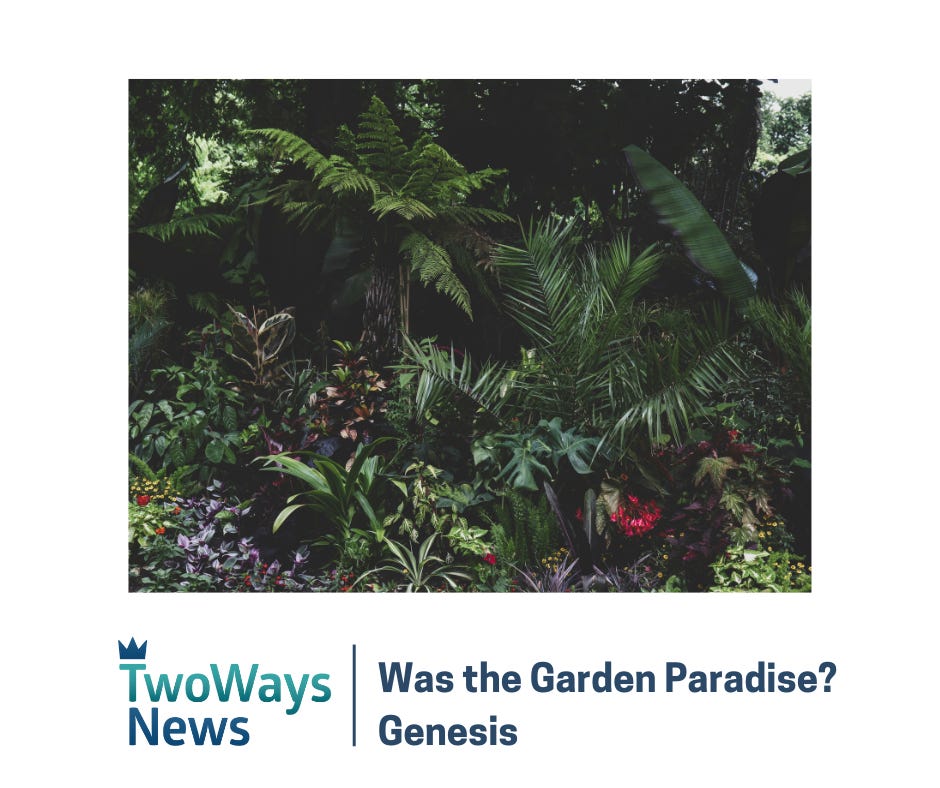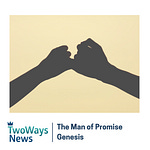Dear friends,
Peter and I love gardens but hate gardening. However, all the good things about the garden are set out in Genesis 2. In today’s podcast, we explore God’s generous provision symbolised in the Garden of Eden. To what extent was the garden paradise that we need to regain? To what extent is the paradise promised to the thief on the cross something greater than the Garden of Eden?
Don’t forget to encourage your friends to subscribe.
Yours,
Phillip
Phillip Jensen: Welcome again to Two Ways News. I am so glad to welcome you along, especially new subscribers, of whom I hear more and more joining, and those old subscribers, keep inviting your friends, and if you're listening and you haven't subscribed yet, then do follow the prompts to do that.
Peter, you don't like gardening much, do you?
Peter Jensen: I love gardens; I hate gardening.
Phillip: Yes, it's a different thing, isn't it?
Peter: It is very different. We were never brought up to garden. But I love gardens, and I'm so grateful that we're surrounded by them where we live. I especially love trees.
Phillip: That may be so because that's the way we've been made. I'm turning to Genesis 2:4
These are the generations of the heavens and the earth when they were created, in the day that the LORD God made the earth and the heavens.
When no bush of the field was yet in the land and no small plant on the field had yet sprung up—for the Lord God had not caused it to rain on the land, and there was no man to work the ground, and a mist was going up from the land and was watering the whole face of the ground—then the Lord God formed the man of dust from the ground and breathed into his nostrils the breath of life, and the man became a living creature. And the Lord God planted a garden, in Eden in the east, and there he put the man whom he had formed. And out of the ground the Lord God made to spring up every tree that is pleasant to the sight and good for food. The tree of life was in the midst of the garden, and the tree of the knowledge of good and evil.
A river flowed out of Eden to water the garden, and there it divided and became four rivers. The name of the verse is Pishon. It is the one that flowed around the whole land of Havilah, where there is gold. And the gold of that land is good; bdellium and onyx stone are there. The name of the second river is Gihon. It is the one that flowed around the whole land of Cush. And the name of the third river is the Tigris, which flows east of Assyria. And the fourth river is the Euphrates.
We start off in the garden.
Peter: Yes, but what does the garden represent? What are we meant to see here in the midst of all this beauty?
Phillip: Well, first and foremost, it's God who's doing it all. And it reflects chapter 1 of Genesis, when that creation account really starts with God creating everything but without form. Then he brings form into it all to make it a habitable place for us. The garden starts off as just dry land, nothing there, and then he develops it into the garden. God sounds more of a gardener than you.
Peter: What you're talking about is order. He created order out of the chaos, both in chapter 1 and also here. Is order a good thing? Some people seem to think that chaos is very good. What about order?
Phillip: Well, a teenager's bedroom can be chaos, but generally speaking, we are better off living in an ordered world than a chaotic world. We can't live in a chaotic world. A certain degree of order is necessary for us to live and to make the world habitable. And this is a garden, but there was no man to work the ground. That is, God made the garden, but God created the man to work in the garden. That seems to be a strange, interesting fact that it's just dry dust, but the man that's created is out of dust. There's a fundamental character of humanity that we are just dust.
Peter: Then he says we are to work the ground, which makes us unique among the animals. We are the image bearers, and we are doing that work. What we learn here is what we see through the Bible, that God uses humanity, in particular, to do his will. He doesn't need us, but he incorporates us and uses us to do his will. So, when it comes to the Bible, he didn't just lower it down from heaven; he inspired the authors of the Bible, human beings, to write, and to write as they would, because you see different styles in the Bible. God takes and uses humanity in forwarding his purposes, which is a very wonderful thing. What an honour.
Phillip: And yet, dust itself is not sufficient for life. So he breathes into the nostrils the breath of life. That is, our life comes from God. We are dependent upon God for our creation in the first place, but also for our enlivenment, for our coming to life, to become a living creature.
It's not saying that we are unique in this, in that all living creatures have the breath of life in them. He goes on to say that we may eat of any fruit, but we may not eat of this tree. Animals do not have that restriction. They did not have the permission given to eat, nor the restriction of what they were not to eat. But in that, we are given morality, purpose, and meaning in our activity, because we are addressed in our conscience, in our mind, to take certain actions and to not take other actions.
Peter: The fundamental necessity for true freedom is order. Anarchy will not yield order. Anarchy does not produce freedom. Now, anarchy sounds like freedom. Everybody's doing what they want to do when they're carrying on in any way they please. But that destroys freedom. I've been in cities where people just drive in any way they please, and it is chaotic. But that's not freedom. Living in a city with order enables a great deal more to be done. It delivers true freedom. And there's also a connection between order and justice. It's no accident that God is a righteous God, and his righteousness is on display here, namely in the rightness of what he does. God, in his righteousness, sets up this perfect place. He creates it with boundaries, necessarily, because you need boundaries if you are to enjoy true freedom.
Phillip: I’ll come back to perfect in a little while, but generosity is a key element of it, though.
Peter: Explain yourself. What do you mean?
Phillip: He provides everything that a human can need. He provides the food for us, but it's more than just the food. Beauty is here too. The trees are beautiful to the sight. He creates the aesthetic beauty; he creates the meaningfulness of work. He creates the man in relationship with him. Later in the chapter, in relationship with the woman, his wife, because it's not good for a man to be alone. There is a famous hierarchy of needs that Mr. Maslow created, where there are certain things everybody needs: clothing, housing, shelter, and food to survive. But above that in the hierarchy, you need more than that to prosper and flourish, as they say these days. You need safety, and above that, you need social life. Living alone is a miserable way of existing, and then esteem, cognition, thinking, and aesthetics are all part, according to Mr. Maslow’s way of thinking about needs. Humans need a lot, though the level of need and the feeling of need are different. My need for aesthetics is different from my need for lunch, yet a life that is only lunch without any aesthetics is very poor. The garden provides richly for everything that we could need.
Peter: Fundamental to it all is something he doesn't mention specifically, and that is language. From the very beginning, this God is a speaking God, and the social life of human beings depends upon communication.
Phillip: In this garden, we have the creation of the woman with whom we have that union and the family life. But the garden is where God walks in the cool of the evening and talks to the man. So there is that sense of language, fellowship, and relationship that is in the garden in a way that's not anywhere else in the scriptures that I can recall, with God walking in the garden to talk to us.
Peter: Do you think what we're seeing here is a picture of heaven? Are we seeing a picture of temples where God dwells among his people? Is that what we're seeing here, which we don't experience?
Phillip: No, but it's paradise, and it's perfection. The word ‘paradise’ is a lone word from the Persians about walls or created gardens, but it is the Greek word that is used to translate the Hebrew word ‘garden’ in this case. Having passed through Easter recently, we are reminded that Jesus says to the thief on the cross, “Today, you will be with me in paradise”. So the picture of heaven is again that picture of this kind of settled garden experience. They were to give you that sense of pleasure of being there. It was the garden of Epicurus, where you came and relaxed and enjoyed life because, for him, there was nothing else but that enjoyment. But it wasn't perfect. You used the word perfect, but perfect means complete and finished, and it wasn't.
Peter: You are referring to the fact that man is set in the garden to work and thus to develop the garden. Therefore, how can it be perfect if work is required to continue to make the garden? Man is there, but it is not good. Everything is declared to be ‘good,’ and then suddenly we're told something's not good, namely, “It is not good for man to be alone” in that case.
Phillip: That could be resolved by the end of the chapter with the creation of the woman. Nevertheless, we've been told in chapter 1 that man is to subdue the animals. You don't have to subdue that which is submissive. What's the hostility? We are told in the beginning of chapter 3 that there is a crafty creature called the serpent who tells lies. That is not a perfect garden.
Peter: Yes and no. It depends on what we mean by ‘perfect’. It is like God declaring good, very good, over the creation. It means that it fits his purposes. It is what he desires. It doesn't necessarily mean that there is no development. There is a serpent in the garden. I estimate that this is good and fit for purpose and that, yes, there will be development in this as Adam works the garden, but that is a product of it being, in that sense, perfect.
Phillip: Well, it's perfect, and it succeeds in fulfilling God's purpose, but God's purpose was well and truly beyond that garden.
You like poetry more than I do, and you read it more than I do, but I've always been struck by the titles of Milton's two poems. The titles are so striking: Paradise Lost1, Paradise Regained2. I don't think that was the intention of God. The intention of God was to have a greater paradise than the paradise that was lost.
Peter: One of the features of this paradise is that God is so present in it, and he is ruling over it. We see human beings in the kingdom of God. But the intrusion of sin has meant that that picture is destroyed. However, in the end, we see the kingdom of God. None of this was outside God's purposes. He took and used even the evil of human beings and created what he intended from the beginning, the magnificent end of all things.
Phillip: That is, Jesus was not plan B. There's a sense in which we can so speak of the paradise of Eden that it sounds as if God set it all up, and then when he took his day off, it all went wrong. Subsequently, he had to recreate something to catch up with what he had intended in the first place, and he had for a little while, namely the Garden of Eden. But we know before the foundation of the world that it was the plan of God that Jesus would redeem the world.
Peter: Yes, this leads to various theological discussions. Was the Incarnation planned beforehand? Was it going to be necessary? It ventures into areas about which we cannot be sure, in my opinion. But I don't doubt your fundamental point, which is that the righteous God knows everything, knows what is going to happen, and takes and uses what has happened so that it produces in the end what he always had in mind. Eden is not a static place. It's not heaven.
Phillip: No, heaven is a better Eden. It has redeemed people in it. Indeed, reborn people. It also has Jesus the man ruling over it in ways that Adam never did, but never could.
Peter: Adam is simply the man of dust, but Christ is the man from heaven.
Phillip: It is perfect in the sense that it perfectly fulfils God's will, but God's will is for a much greater thing that is yet to come in the death, resurrection, and ascension of the Lord Jesus and his return in glory. There is going to be a much greater garden than the garden we have here in Genesis 2.
Peter: Will there be work in the age to come?
Phillip: Well, you and I will be praying that it's not gardening.
Peter: Well, I am praying that there will be gardeners in that case.
Phillip: Well, either that or we will be so transformed in the resurrection that we will enjoy it.
Peter: Do you not think that work is integral to humanity?
Phillip: It is in this world, but it's very hard to know what the next world holds.
Peter: I am interested in something in 2 Corinthians 5:8-9, which says, “So whether we are at home or away, we make it our aim to please him.” Whether in heaven or here, we aim to please him. If the great aim of our life, our work, if you like, is to please Christ, then I take it that that continues in the next world. Our work may be totally transformed, but nonetheless, it is still purposive.
Phillip: Will our lives be purposeful there? Yes. Will we seek to be pleasing the Lord there? Yes. Do I want to use the word “work”, which is a very difficult word to define?
Peter: Why don't we discuss work sometime? We'll have a work session.
Phillip That's a great idea. It is interesting that this garden is so noted geographically. “The Lord planted the Garden of Eden in the East,” that is, in the east of where the writer is. He speaks of it in terms of being between the Tigris and the Euphrates River, as well as two other rivers that we don't know of. Somewhere in that Assyrian Babylonian place of the rivers that lead down to the Persian Gulf, there was a garden planted. The whole world was not the garden. There was a garden planted somewhere in the world where this man was placed. It's a question that people have asked as to whether he was the only man at this point. In a few chapters' time, Cain is driven further away. He's worried about the other people who might hurt him and who have built cities as he goes to build. And so, as if there is more to the world than the Garden of Eden, that makes it strange as to where and what it is.
Peter: This section of the Bible, in particular, is highly selective. We are being introduced to great, overwhelmingly important ideas, but it by no means answers all the questions that we would want to ask. For example, where did Cain get his wife from? It doesn't seek to answer them; it wants us to focus on what it is saying to us. Secondly, we will never find the exact location of the Garden of Eden. It's interesting that it's located in a geographical place. It's intended to be reality. But on the other hand, as we're told at the end of chapter 3, Adam and Eve are expelled from the garden, and there's a guard set over it so that they cannot return. I take it therefore, that the garden no longer exists and that there's no way back into it.
Phillip: It doesn’t say that it doesn’t exist; it’s just that there is no way back. It says it's there in its form and fashion that is not the same as the form and fashion we're in. Which is surprising because it's described so much as being in the form and fashion we're in. Trees, location, where it is, but there are other features like the talking snake, which is not part of the form and fashion of the world that I'm in. I haven't had a conversation with one lately, and so it is very different, and yet it is located as the same.
There is a very important part of the Old Testament where the prophet Nathan speaks to David.
Peter: Yes, Nathan is conscious of a crime that David has committed, and his task is to come to David and accuse him of this crime. But instead of doing it directly, he tells him a story. He tells him the story of stealing some sheep and a rich man and a poor man. David becomes extremely angry and condemns the rich man and, in a sense, is ready to leap into action to take justice, and then the prophet says, “You are the man.” He has told him a parable that exposes David's inner heart without David being aware of it. It's a parable of the truth. The events of which he speaks are true, but they come to us in parabolic form. One of the possible suggestions in thinking about the Garden of Eden and the events of chapter 3 is to think of them, perhaps, as parabolic in the sense that they're telling you the truth and they're telling you of real events. There was a garden, there was Adam and Eve, and there was a rebellion against God, but telling it to you in such a way that it makes immediate sense. You can understand it and a way in which it immediately involves you in what matters, namely your own conscience. That's been suggested; it's been suggested by some good people, good scholars. To my mind, it's an attractive possibility.
Phillip: The parable is about real life, so David sees the injustice but is found out, “You are the man.” What is it that Genesis 2 and the garden tell us? It removes any chance of humans blaming God. Because what God has provided for us is everything that we could possibly need in the garden. There's everything that you could need in terms of the food that you need, the beauty you need, and the work that you need, in terms of each element of life that you could possibly want. It's given to you and given to you in abundance with these two trees. We'll do another podcast on the trees because those two trees stand at the centre and are so important. One, the tree of life, which has got to be symbolic for very important things. And the other, this strange tree, the tree of the fruit of the knowledge of good and evil, that we were never to eat. And that is there for good purpose and reason. It's being set up for the future.
While you were reading in your teenage years, Peter, I was watching movies, especially Westerns. They always started with a peaceful scene. It always set the scene of a beautiful landscape, lovely farmland, beautiful animals, and a nice family; everything was going sweetly and beautifully. The hero would be patting the dog and playing with his children, having done a hard day's work. And then something came in to disturb the beauty. Well, the garden is that setting. Everything that you could want is set up with perfection until… But we'll find out more about the ‘until’ in the next podcast.
John Milton, Paradise Lost (London, Samuel Simmons, 1667)
John Milton, Paradise Regained (London, Kingdom of England, 1671)
Scripture quotations are from The ESV® Bible (The Holy Bible, English Standard Version®), copyright © 2001 by Crossway, a publishing ministry of Good News Publishers. Used by permission. All rights reserved.
Links & Recommendations
For more on this topic, check out this sermon by Phillip on Genesis 2.
Why not help support Two Ways News?
If you enjoy Two Ways News, why not lend us a hand? Consider joining our Supporters Club—friends who make it possible for us to keep producing this article/podcast.
To join the Supporters Club, follow the link below to the ‘subscribe’ page. You’ll see that there’s:
a number of ‘paid options’. To join the Supporters Club take out one of the paid ‘subscription plans’ and know we are deeply grateful for your support!
also the free option (on the far right hand side)












